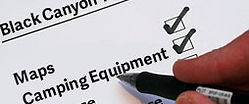Leave No Trace Practices for River Corridors
Plan Ahead and Prepare
Travel and Camp on Durable Surfaces
Respect Wildlife
Dispose of Waste Properly
Leave What You Find
Be Considerate of Other Visitors
Minimize Campfire Impacts
Learn about river-specific issues, regulations and permits. Use a river guidebook and map to plan your trip. Know river skills and carry the necessary equipment to enjoy the river safely. Schedule your trip so that you encounter appropriate river flows for your group’s ability. Prepare for extreme weather, hazards and emergencies. Avoid times of high use, and travel in small groups. Repackage food to minimize waste.
Durable surfaces include water, rock, gravel and sand. Focus activity where vegetation is absent. Concentrate use on existing trails and campsites. Walk single file, in the middle of the trail, even when muddy. Leave put-ins, take-outs and campsites clean and natural looking.
Pack it in, pack it out. Generally, the best practice is to pack out human waste, toilet paper, and tampons. Urinating directly into the river is often the best option. Use a tarp in the kitchen to catch food and trash, which attract unwanted animals. Liquid wastes can be dumped into the main current in many high volume (over 500 cfs) rivers. In low volume rivers, scatter liquid waste 200 ft. from water, away from camps and trails. Pack out all small food particles and trash. Always check local regulations.
Appreciate ancient structures, artifacts, rock art and other natural objects but leave them undisturbed. Do not build structures or dig trenches in campsites. Avoid introducing non-native or invasive species by cleaning equipment between trips.
Observe wildlife from a distance. Do not follow or approach them. Never feed wildlife; it damages their health, alters natural behaviors and exposes them to predators and other dangers. Always properly store food and trash. Control pets or leave them at home. Avoid wildlife during mating, nesting, or when food
Respect other visitors and the quality of their experience. Communicate with other river users about your floating and camping plans to avoid conflicts. Leave larger camps for larger groups. Let nature’s sounds prevail.


The member-driven Leave No Trace Center for Outdoor Ethics teaches people how to enjoy the outdoors responsibly. This copyrighted information has been reprinted with permission from the Leave No Trace Center for Outdoor Ethics: www.LNT.org





Carry a fire pan or use a designated fire ring. Consider using stoves for cooking. Elevate firepan and use a fire blanket to catch embers. Learn about local fire regulations. Consider bringing your own firewood or charcoal. Use wood no larger than an adult’s wrist to keep the fire small. Burn all wood and charcoal to ash. Carry out ash with other garbage.

